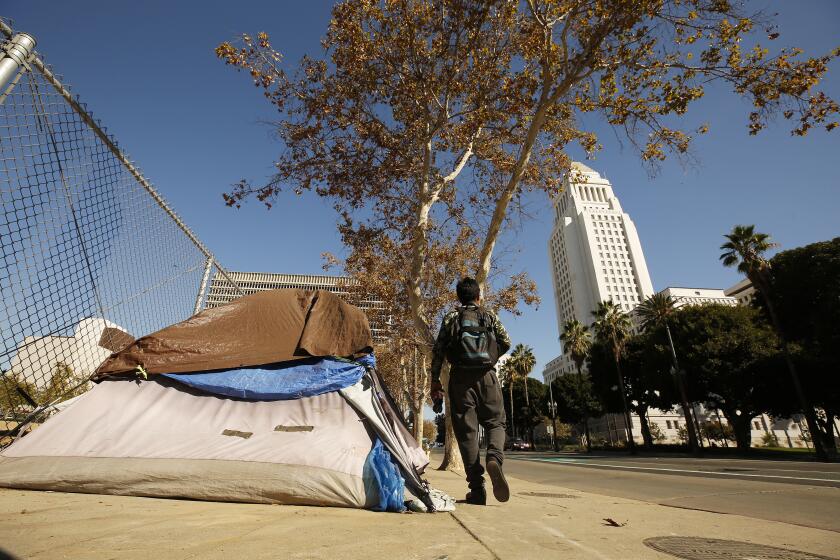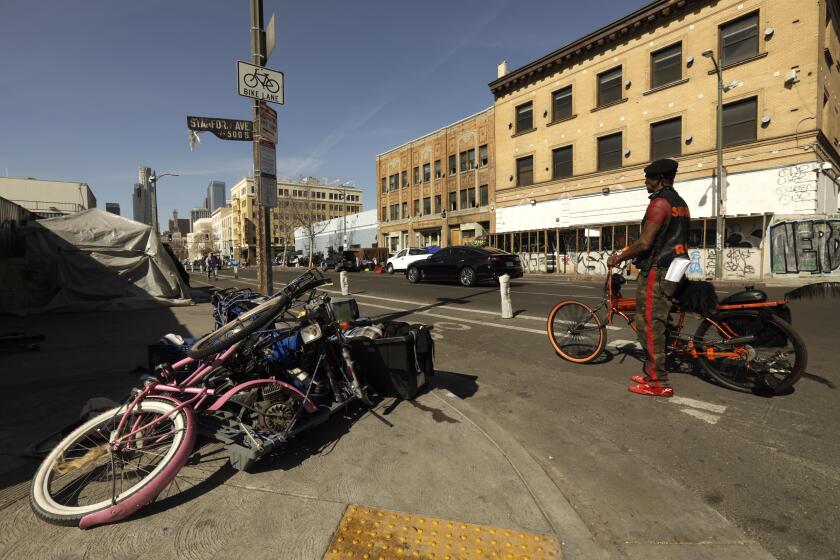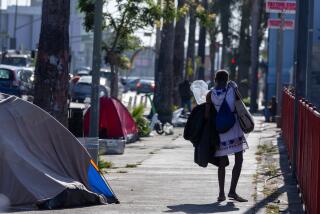L.A. voters are angry, think elected officials aren’t equipped to solve homelessness
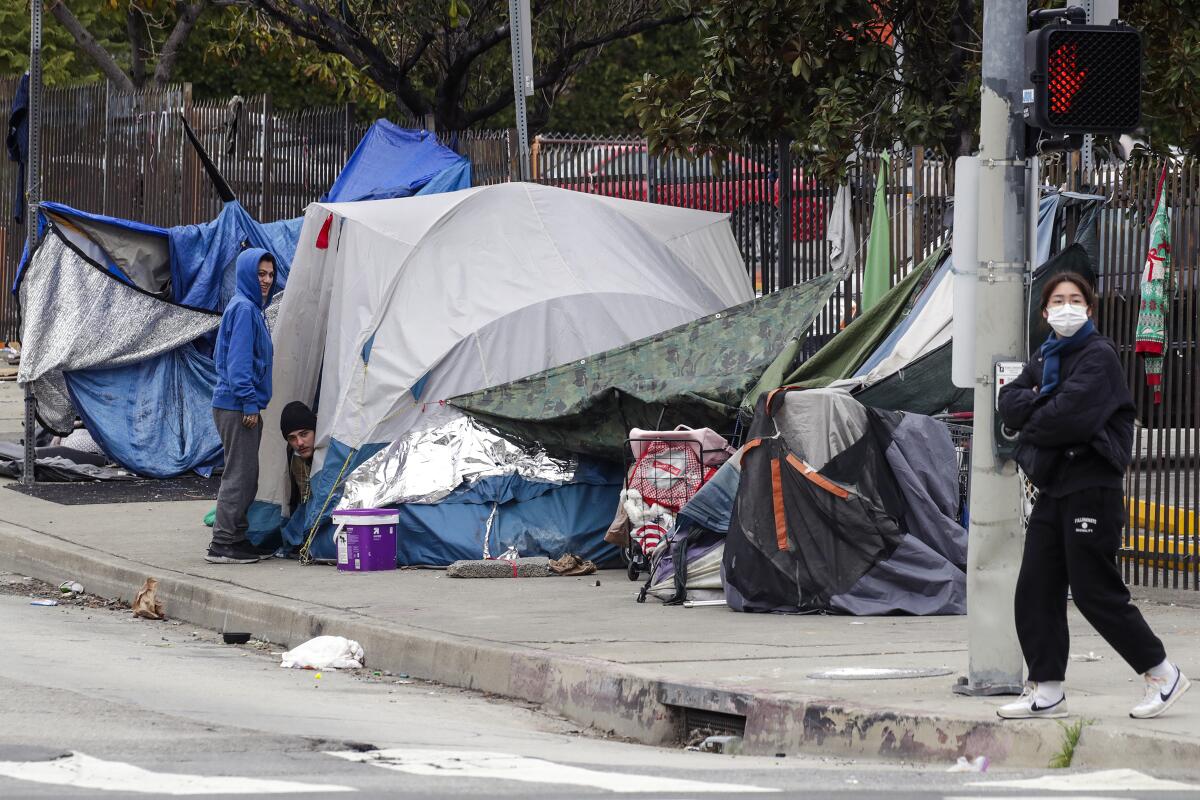
- Share via
“The degradation of life in L.A. is exponential, and I don’t see an end. The politicians are doofuses,” a white male voter said.
“California is the fifth-largest economy in the world. Why can’t we do anything?” a Black voter wondered.
“I run into one or two every day, and I wonder: This is someone’s son. Did he refuse help? How can you help them? We’re failing them,” a Latino voter remarked.
The comments came from voters in a series of diverse focus groups conducted in December by the Committee for Greater L.A., a coalition of civic leaders, to gauge public sentiment on homelessness heading into campaigns for Los Angeles mayor and county supervisor.
A report on the survey was released Thursday. The coalition shared transcripts of the focus groups and a summary of the interviews with The Times with the identities of the participants omitted.
A series of diverse focus groups conducted in December, found Angelenos are angry over the condition of the streets, disturbed by the human suffering taking place on them and frustrated with the inability of government to do anything about it.
The professional pollsters who led the conversations with 39 people in six groups said they were stunned by the depth of feeling and unanimity across party affiliation, socioeconomic standing, race and ethnicity.
They hoped the findings could help shape how candidates talk about the crisis in an election season that is starting to heat up.
“I’ve probably sat through, I don’t know, a couple hundred focus groups ... and never in my entire career, which is many decades, have I ever seen this kind of result,” longtime political strategist Darry Sragow, who led the research, said in an interview.
Angelenos, the pollsters concluded, are angry over the condition of the streets, disturbed by the human suffering taking place on them and frustrated with the inability of government to do anything about it. They want elected officials to set realistic goals, pursue tough policies and hold themselves accountable.
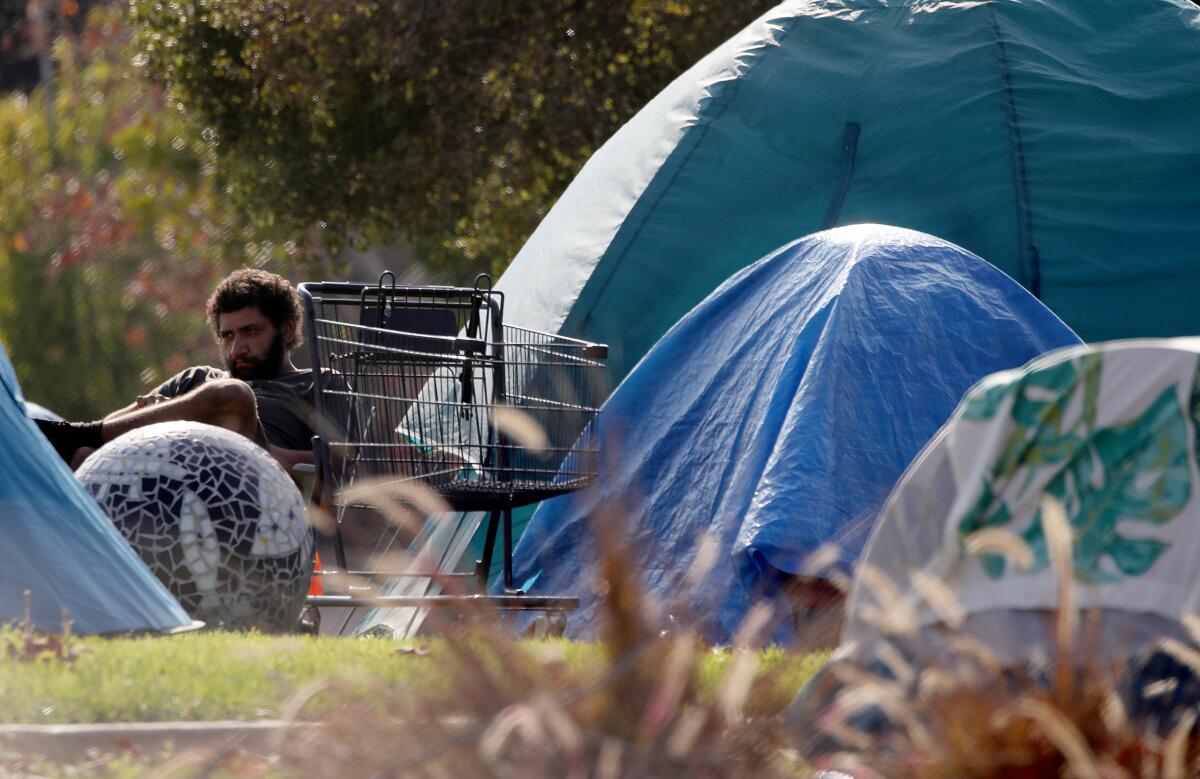
“You go to the store, you go to school, you go to work, and there they are, they’re everywhere,” Sragow said of the homeless people camped on streets around the county. “They’re just everywhere. And the measure of success will be when they’re not everywhere.”
The findings of the focus groups square with a poll conducted late last year by the Los Angeles Business Council Institute in cooperation with The Times. It found that 94% of voters view homelessness as a serious or very serious problem and want the government to act faster and focus on shelter for people living in the streets, even if those efforts are short term and fall short of permanent housing.
Get the lowdown on L.A. politics
Sign up for our L.A. City Hall newsletter to get weekly insights, scoops and analysis.
You may occasionally receive promotional content from the Los Angeles Times.
Unlike political polls, which are drawn from random samples, focus groups do not produce findings with statistical accuracy or have margins of error. Pollsters use them to elicit a spontaneous picture of what voters are thinking.
A key difference emerged in how the two surveys appraised voters’ openness to new tax measures.
The Times poll found a slight majority would favor a hypothetical ballot proposal to raise more money to address homelessness. The focus groups tapped into a deep disillusionment with the lack of progress from past measures and distrust for the political leaders who promised results.
“The hard thing is that we all hear that the government is spending, but we don’t see it. Like, we, the residents of L.A. County, cannot see it,” one millennial voter said. “They always say, like, ‘Oh, we’re building these,’ or ‘We’re going to build these,’ or ‘We have this project’ and it’s like, ‘Yeah, yeah, yeah.’”
The Los Angeles Business Council Institute and The Times polled L.A. County voters to see how opinions on homelessness have shifted amid the pandemic.
In particular, participants saw corruption in City Hall — one council member convicted and two under indictment — as evidence or at least reason to fear that homelessness funds are being misspent or outright stolen.
Saturday is the filing deadline for candidates to declare their interest in running for elected positions in the city of Los Angeles. Already homelessness has become a central issue with candidates attempting to stake out positions to differentiate themselves from the pack.
The organizers of this survey said the results offered a primer on how candidates should be discussing this humanitarian crisis, which has only worsened in recent years. Voters are frustrated by the state of the streets but also compassionate for the people living on them, they said.
Overly ambitious and vague goals won’t play. Angelenos want to hear plans that are achievable and have concrete timelines and results.
Under the leadership of Miguel Santana, president and chief executive of the Weingart Foundation, the Committee for Greater L.A. commissioned a 2020 report that proposed dismantling “structures designed to maintain the privileged by intentionally excluding and marginalizing others” and “prioritizing how resources will be directed in order to achieve a more accountable Los Angeles driven by outcomes centered on racial equity.”
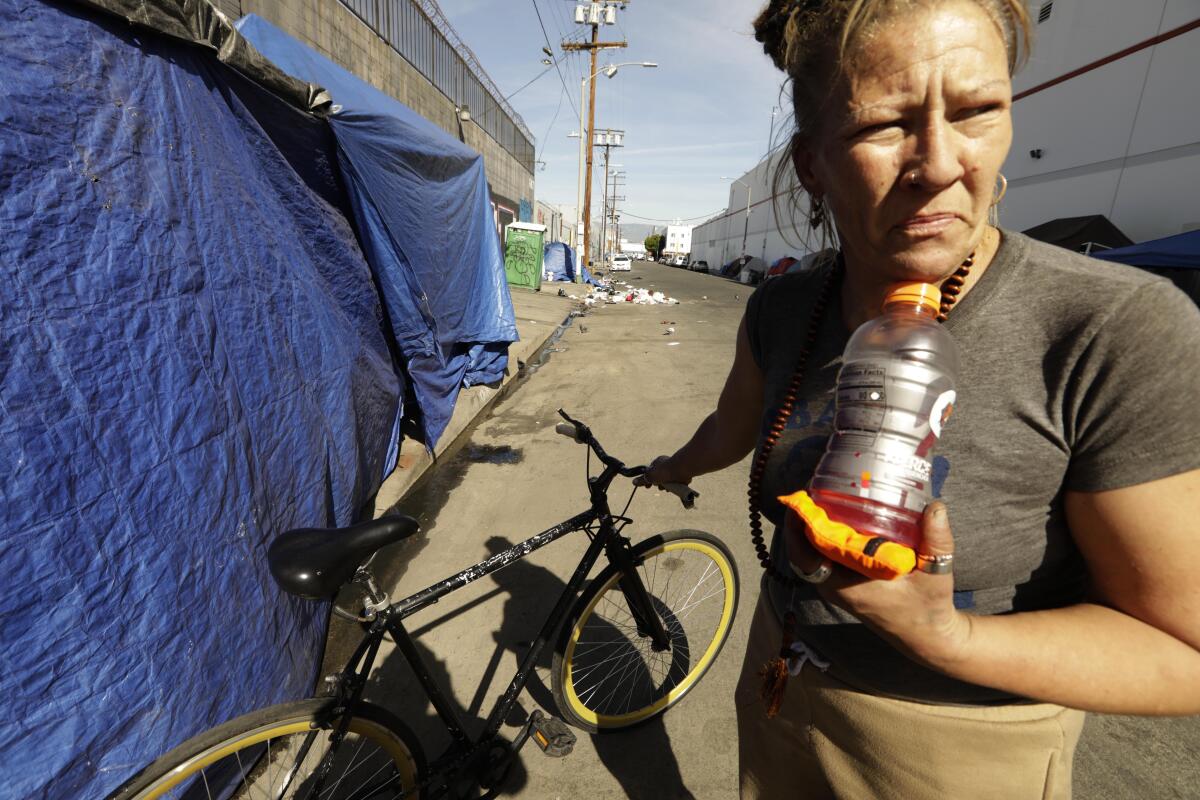
Last year, the committee proposed a new quasi-governmental structure called the Center to “disrupt, dismantle and rebuild the systems that allow neighbors to fall into and languish in homelessness.”
The committee hired Sragow, senior counsel with the Dentons law firm and business and political advisor who has managed three gubernatorial campaigns, to probe how the proposal could be refined to gain more momentum after its initial launch attracted little media attention.
Sragow brought in David Binder Research, a polling firm that has worked with Gov. Gavin Newsom and former President Obama and will work on behalf of mayoral candidate Karen Bass.
The message for candidates is that voters have a nuanced view of the problem, the researchers said. They see a need for a firmer stance to remove drugs from the streets and to require people with severe mental illness to go into public facilities. Yet they also remain empathetic.
“It’s just sad,” a Black participant said. “You look at someone and say it could be you.”
“I feel pity, but at the same time, it’s repulsive,” a white voter said. “So many mixed emotions.”
Sragow said candidates would be wise to modulate their messages accordingly.
“Don’t get into a war with the other candidates proving who is going to be the toughest person on the block when it comes to homelessness,” Sragow said
“I would urge a candidate for mayor to follow what you saw in the research and say, ‘It’s just not going to be solved overnight. It is a huge problem. It wasn’t created overnight. It’s not going to be solved overnight, and we need a coordinated, consistent, accountable approach to make sure that the resources that are available are used effectively.’”
Ethan Axelrod, an analyst with the Binder firm who led the focus groups, noted that during the sessions, L.A. County Sheriff Alex Villanueva came up and was most associated with a “tough” approach on homelessness and clearing encampments.
Still, Axelrod noted, respondents nearly universally recognized that this response to homelessness was not a long-term solution.
The Los Angeles City Council voted 10-4 to ask City Atty. Mike Feuer to draft a law prohibiting bikes from being repaired or sold on streets or sidewalks.
“People are really well aware that, if you’re moving people out of a homeless encampment right now, that really means you’re moving them to a different location. So, I think that sort of illustrates a bit the pitfalls of trying to be the most aggressive, the most tough on this issue,” Axelrod said.
(Axelrod said he will not be involved in the Binder firm’s work for the Bass campaign.)
Participants expressed a lack of confidence in the fractured political structures of L.A. County to achieve long-range solutions. Though lukewarm on the specifics of the Committee for Greater L.A.’s proposal for the Center, they generally supported the idea of an independent body outside of government to oversee homeless programs.
“It’s kind of appealing that it’s an independent organization outside of government,” a white woman said. “If you put it in the private sector, you can get [things] done instead of going through government. Everything is stalled. Money doesn’t go to the right areas.”
“I would support it,” a Black voter said. “At least we’re trying to do something. I want a whole group of people to be accountable.”
- Share via
Watch L.A. Times Today at 7 p.m. on Spectrum News 1 on Channel 1 or live stream on the Spectrum News App. Palos Verdes Peninsula and Orange County viewers can watch on Cox Systems on channel 99.
More to Read
Sign up for Essential California
The most important California stories and recommendations in your inbox every morning.
You may occasionally receive promotional content from the Los Angeles Times.
